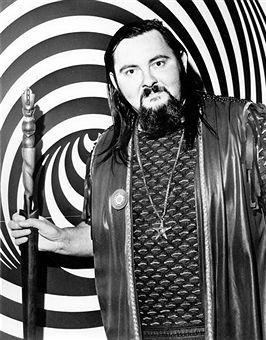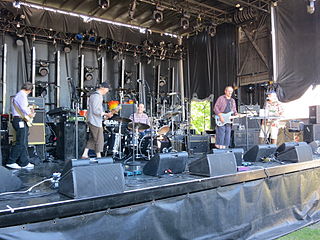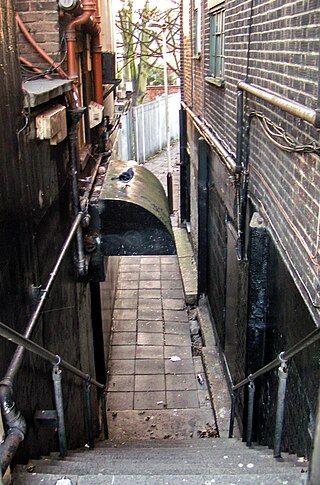
Alexis Andrew Nicholas Koerner, known professionally as Alexis Korner, was a British blues musician and radio broadcaster, who has sometimes been referred to as "a founding father of British blues". A major influence on the sound of the British music scene in the 1960s, he was instrumental in the formation of several notable British bands including The Rolling Stones and Free.

John Mayall, OBE is an English blues and rock singer and musician whose career spans over sixty years. In the 1960s, he formed John Mayall & the Bluesbreakers, a band that has counted among its members some of the most famous blues and blues rock musicians.
British blues is a form of music derived from American blues that originated in the late 1950s, and reached its height of mainstream popularity in the 1960s. In Britain, blues developed a distinctive and influential style dominated by electric guitar, and made international stars of several proponents of the genre, including the Rolling Stones, the Animals, the Yardbirds, Eric Clapton, Fleetwood Mac and Led Zeppelin.

John Symon Asher “Jack” Bruce was a Scottish musician, singer, songwriter and composer. He gained popularity as the primary lead vocalist and bassist of rock band Cream. After the group disbanded in 1968, he pursued a solo career and also played with several bands.
Cyril Davies was an English blues musician, and one of the first blues harmonica players in England.

Richard Malden "Dick" Heckstall-Smith was an English jazz and blues saxophonist. He played with some of the most influential English blues rock and jazz fusion bands of the 1960s and 1970s. He is known for primarily playing tenor, soprano, and baritone saxophones, as well as piano, clarinet and alto saxophone.
The Graham Bond Organisation (GBO) were a British jazz/rhythm and blues group of the mid-1960s consisting of Graham Bond, Jack Bruce (bass), Ginger Baker (drums), Dick Heckstall-Smith and John McLaughlin (guitar). They recorded several albums and further recordings were issued when the group's members achieved fame in progressive rock and jazz fusion. The spelling of the band's original name varied between releases, often depending on the intended audience. The British English spelled as "Organisation" or "ORGANisation", while in some other countries outside the UK spelled "Organization".

The Marquee Club was a music venue in London, England, which opened in 1958 with a range of jazz and skiffle acts. It was a small and relatively cheap club, in the heart of London's West End.

Graham John Clifton Bond was an English rock/blues musician and vocalist, considered a founding father of the English rhythm and blues boom of the 1960s.

David William Kelly is a British blues singer, guitarist and composer, who has been active on the British blues music scene since the 1960s. He has performed with the John Dummer Blues Band, Tramp, The Blues Band, and his own Dave Kelly Band.
Anthony "Top" Topham was an English musician and visual artist who was best known as a blues guitarist and also for being the first lead guitarist of The Yardbirds. Topham left the band before they achieved mainstream popularity and was replaced by Eric Clapton, the first of three lead guitarists from the Yardbirds to gain an international reputation.
Michael Waller was an English drummer, who played with many of the biggest names on the UK rock and blues scene, after he became a professional musician in 1960. In addition to being a member, albeit sometimes briefly, of some of the seminal bands of the 1960s, Waller played as a session musician with a host of UK and US artists.
Blue Horizon Records was a British blues independent record label, founded by Mike Vernon and Neil Slaven in 1965, as an adjunct to their fanzine, R&B Monthly, and was the foremost label at the time of the British blues boom in the mid to late 1960s.

Duffy Power was an English blues and rock and roll singer, who achieved some success in the 1960s and continued to perform and record intermittently later.

R&B from the Marquee is an album by Alexis Korner's Blues Incorporated released in November 1962 on Decca Records. Blues Incorporated was a British rhythm and blues band in the early 1960s. Although never very successful commercially, it was extremely influential on the development of British rock music in the 1960s and later.
British rhythm and blues was a musical movement that developed in the United Kingdom between the late 1950s and the early 1960s, and reached a peak in the mid-1960s. It overlapped with, but was distinct from, the broader British beat and more purist British blues scenes, attempting to emulate the music of American blues and rock and roll pioneers, such as Muddy Waters and Howlin' Wolf, Chuck Berry and Bo Diddley. It often placed greater emphasis on guitars and was often played with greater energy.
Geoffrey Frank Bradford was an English guitarist who played alongside British blues musicians in the 1950s and 1960s, such as Long John Baldry and Alexis Korner.

Klooks Kleek was a jazz and rhythm 'n’ blues club on the first floor of the Railway Hotel, West Hampstead, north-west London. Named after "Klook's Clique", a 1956 album by jazz drummer Kenny Clarke, the club opened on 11 January 1961 with special guest Don Rendell and closed nine years later on 28 January 1970 after a session by drummer Keef Hartley’s group.











